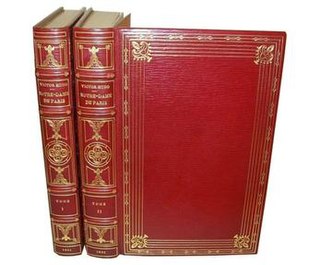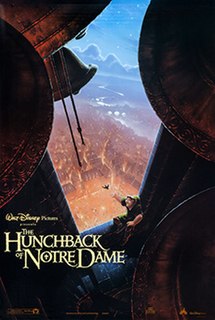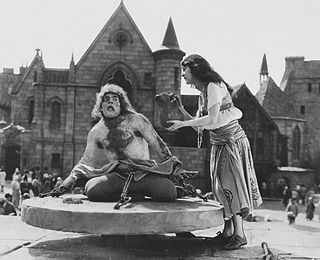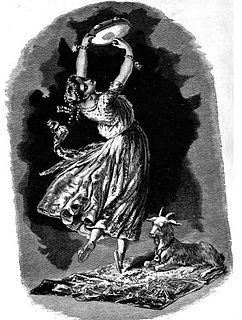See also
- Quasimoto (born 1973), an American rapper
Quasimodo is the title character in Victor Hugo's novel The Hunchback of Notre Dame.
Quasimodo may also refer to:

The Hunchback of Notre-Dame is a French Gothic novel by Victor Hugo, published in 1831.

The Hunchback of Notre Dame is a 1996 American animated musical drama film produced by Walt Disney Feature Animation and released by Walt Disney Pictures. The 34th Disney animated feature film and the seventh produced during the Disney Renaissance, the film is based on the 1831 novel of the same name by Victor Hugo. The plot centers on Quasimodo, the deformed bell-ringer of Notre Dame, and his struggle to gain acceptance into society. Directed by Gary Trousdale and Kirk Wise, the film's voice cast features Tom Hulce, Demi Moore, Tony Jay, Kevin Kline, Paul Kandel, Jason Alexander, Charles Kimbrough, David Ogden Stiers, and Mary Wickes in her final film role.

The Hunchback of Notre Dame is a 1939 American romantic drama film starring Charles Laughton and Maureen O'Hara. Directed by William Dieterle and produced by Pandro S. Berman, the film is based on Victor Hugo's 1831 novel.

Quasimodo is a fictional character and the main protagonist of the novel The Hunchback of Notre-Dame (1831) by Victor Hugo. Quasimodo was born with a hunchback and feared by the townspeople as a sort of monster, but he finds sanctuary in an unlikely love that is fulfilled only in death. The role of Quasimodo has been played by many actors in film and stage adaptations, including Lon Chaney, Sr. (1923), Charles Laughton (1939) and Anthony Quinn (1956), as well as Tom Hulce in the 1996 Disney animated adaptation, and most recently Angelo Del Vecchio in the Notre Dame de Paris revival. In 2010, a British researcher found evidence suggesting there was a real-life hunchbacked stone carver who worked at Notre Dame during the same period Victor Hugo was writing the novel and they may have even known each other.
Clopin Trouillefou is a fictional character first created in the 1831 novel The Hunchback of Notre-Dame by French author Victor Hugo, and subsequently adapted.

MonseigneurClaude Frollo is a fictional character and the main antagonist of Victor Hugo's 1831 novel The Hunchback of Notre-Dame. He is the Archdeacon of Notre Dame.

The Hunchback of Notre Dame is a 1956 French-Italian CinemaScope film version of Victor Hugo's 1831 novel, directed by Jean Delannoy and produced by Raymond Hakim and Robert Hakim. It stars American actor Anthony Quinn and Italian actress Gina Lollobrigida. The film is the first version of the novel to be made in color.

The Hunchback of Notre Dame II is a 2002 American animated film directed by Bradley Raymond. The direct-to-video sequel to the 1996 Disney film The Hunchback of Notre Dame, the film was produced by Walt Disney Animation Japan and Walt Disney Television Animation. Critical reception was generally negative.

Esmeralda, born Agnès, is a fictional character in Victor Hugo's 1831 novel The Hunchback of Notre-Dame. She is a French Roma girl. She constantly attracts men with her seductive dances, and is rarely seen without her clever goat Djali. She is around 16 years old and has a kind and generous heart.
CapitainePhœbus de Châteaupers[febys də ʃɑtopɛːʁ] is a fictional character and one of the main antagonists in Victor Hugo's 1831 novel, Notre-Dame de Paris. He is the Captain of the King Louis XI's Archers. His name comes from Phoebus, the Greek god of the sun.

The Hunchback of Notre Dame is a musical based on the 1831 novel of the same name written by Victor Hugo with songs from the 1996 Walt Disney Animation Studios film adaptation.
Esmeralda is a 1905 French short silent film based on the 1831 novel The Hunchback of Notre-Dame written by Victor Hugo. It was directed by Alice Guy-Blaché and Victorin-Hippolyte Jasset.

The Hunchback is a 1997 made-for-television romantic drama film based on Victor Hugo's iconic 1831 novel The Hunchback of Notre-Dame, directed by Peter Medak and produced by Stephane Reichel. It stars Richard Harris as Claude Frollo, Salma Hayek as Esmeralda and Mandy Patinkin as Quasimodo, the titular hunchback of Notre Dame.
The Hunchback of Notre-Dame is an 1831 novel by Victor Hugo.
Esmeralda is a 1922 British silent film and an adaptation of the 1831 novel The Hunchback of Notre-Dame by Victor Hugo, with more emphasis on the character of the gypsy girl rather than Quasimodo. It was directed by Edwin J. Collins and starred Sybil Thorndike as Esmeralda and Booth Conway as the hunchback. The film is considered lost, but extant still photos show a 40-year-old Thorndike who appears to be too old for the role of the young and virginal Esmeralda. This version emphasized romance and melodrama over horror.
"God Help the Outcasts" is a song written by composer Alan Menken and lyricist Stephen Schwartz for Walt Disney Pictures' 34th animated feature film The Hunchback of Notre Dame (1996). A pop ballad, the song is performed by American singer Heidi Mollenhauer as the singing voice of Esmeralda on American actress Demi Moore's behalf, who provides the character's speaking voice. A prayer, "God Help the Outcasts" is a somber hymn in which a beset Esmeralda asks God to shield outcasts and Roma like herself against racism and discrimination at the hands of Paris and Judge Claude Frollo. The song also establishes Esmeralda as a selfless, empathetic character with whom Quasimodo falls in love.
"A Guy Like You" is a song from Disney's 1996 film The Hunchback of Notre Dame. It is performed by the three gargoyles as they try to console Quasimodo. The song was also featured in the German stage musical version, but was replaced with Flight into Egypt for the North American Stage Production.
"Topsy Turvy" is a song from Disney's 1996 animated feature The Hunchback of Notre Dame. The song is 5:37 minutes long and is performed by Clopin.
The Hunchback of Notre Dame is a Disney media franchise, commencing in 1996 with the release of The Hunchback of Notre Dame. The franchise is based on the 1831 novel of the same name by Victor Hugo.
"Made of Stone" is a song written for the 1999 (German) and 2014 (English) stage adaptions of Disney's 1996 animated film The Hunchback of Notre Dame, based on the book of the same name by Victor Hugo. It is performed by Quasimodo and the Greek chorus of gargoyles.